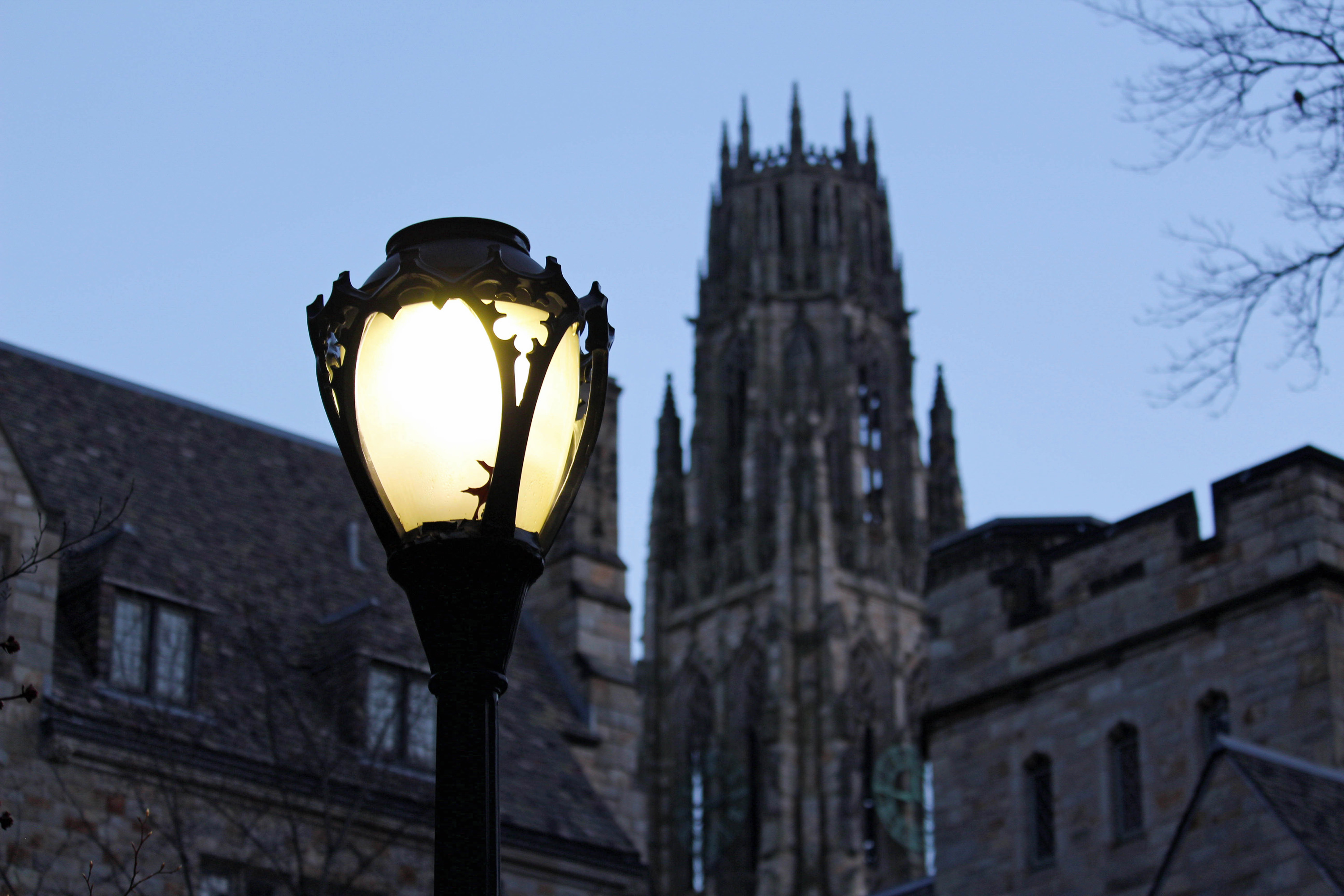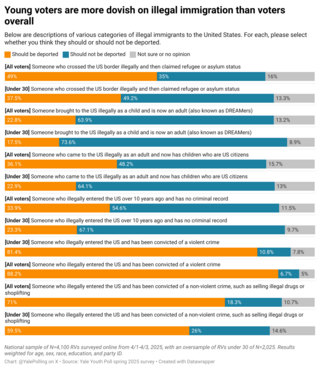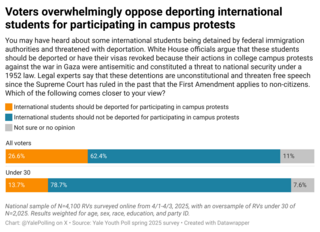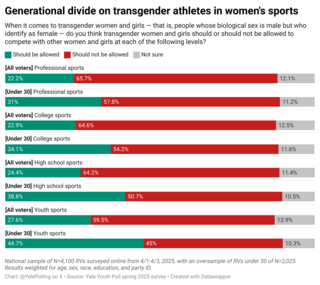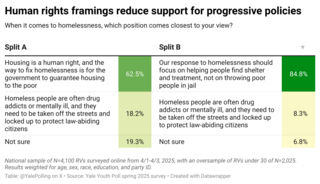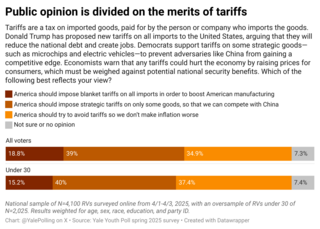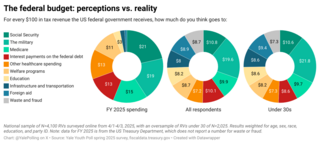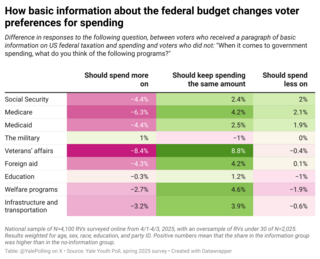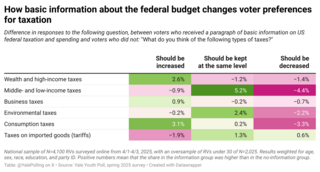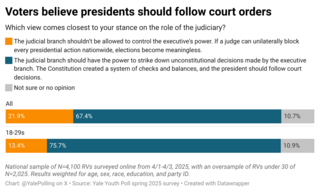The Yale Youth Poll, an undergraduate-led research project at Yale University, today released a new poll of young American voters (aged 18-29) and the general population. The poll sampled 4,100 self-reported registered voters, including 2,025 voters aged 18-29, enabling a comparison of young voters to the electorate as a whole.
The survey included a range of questions on subjects from higher education to immigration to what the federal budget is spent on. The poll also implemented two A/B tests to gauge the effect of framing progressive policies as “human rights” and whether providing voters with basic information about government finances changes their views on the federal deficit, tax rates, and spending levels. The first message test found that arguing for progressive policies on homelessness on the grounds of “human rights” reduced support for the progressive position by 22 points.
The widest generational divides appeared on immigration and protest rights. While voters overall opposed allowing asylum seekers who enter the country illegally to stay by a 2-point margin, young voters supported allowing them to remain by a 25-point margin. On the question of whether international students should be deported for protesting the war in Gaza, voters overall opposed deportation by 36 points, while young voters opposed deportation by 65 points.
Voters under 30 were nearly split on whether teens aged 13 to 17 should be allowed access to gender transition treatments, opposing it by just a 0.1-point margin in comparison to the broader electorate, which opposed it by 24 points. They also differed on campus speech, with young voters supporting universities making political or social statements by a 6-point margin, while the broader electorate opposed such statements by a 13-point margin.
Young voters’ views on institutional trust and democratic reform followed a similar pattern. Young voters were more likely to say the Supreme Court rules based on ideology or partisanship rather than legal reasoning, whereas voters overall saw the Supreme Court as ruling based on the legal merits of cases.
Finally, our data uncovered an interesting divide within under–30s as a cohort: When asked whether they would vote for the Democratic or Republican candidate in the 2026 congressional elections in their district, voters aged 22–29 favored the Democratic candidate by a margin of 6.4 points, but voters aged 18–21 favored the Republican by a margin of 11.7 points.
Trump, Vance, Musk are Unpopular with Everyone
Among voters overall, 46.5% had a favorable opinion of President Trump, while 52.7% had an unfavorable opinion (net favorability -6.2). Vice President Vance’s net favorability was -13.5, and Elon Musk’s net favorability was -18.9. Former Vice President Harris’s net favorability was -12.5, and former President Biden’s net favorability was -21.3.
Among voters under 30, President Trump’s net favorability was -17.9; Vice President Vance came in at -30; and Elon Musk was the least popular, at -34.7. Former Vice President Harris came in at -1, and former President Biden was at -19.5.
22.8% of voters overall identified as moderate, with 39.3% calling themselves somewhat or very liberal and 37% calling themselves somewhat or very conservative. 18.6% of young voters identified as moderate, while 48.4% called themselves somewhat or very liberal, and 31.9% said they were very or somewhat conservative.
Voters Overwhelmingly Support Taxing University Endowments, Expanding Pell Grants to Cover Trade School; Age Gap on Institutional Neutrality
When asked whether universities should publish statements that take a position in response to current political and social issues, 38.4% of voters overall said that they should, while 51.4% said they should not and 10.1% were unsure. But among voters under 30, 48.9% supported universities issuing statements, while 42.9% opposed and 8.2% were unsure.
When asked how they saw standardized tests, such as the SAT and ACT, 67.3% of voters overall and 66.6% of young voters said that the tests were mostly fair and made college admissions more meritocratic, compared to 17.3% of voters overall and 17.7% of young voters who said the tests were racially biased. A plurality (42.2%) of voters overall favored requiring standardized test scores for university admissions, while a majority (52.1%) of young voters preferred a test-optional admissions system.
Across age groups, trade school professors were the most trusted to educate America’s youth (+67.7 overall, +63 with young voters), while professors at private for-profit colleges were the least trusted (+10.2 overall, +16.2 with young voters).
The net favorability of elite private universities such as the Ivy League with voters overall was -4.2, with 35.1% feeling favorable, 39.3% feeling unfavorable, and 25.6% feeling neutral towards them. Among young voters, elite universities’ net favorability was +7, with 42.6% feeling favorable, 35.5% feeling unfavorable, and 21.9% feeling neutral.
87.9% of voters overall and 85% of young voters supported changing the law so that Pell Grants can be used for trade schools. 55.8% of voters overall supported a 21% tax on the annual profits of university endowments over $10 billion, as did 56.1% of voters under 30.
